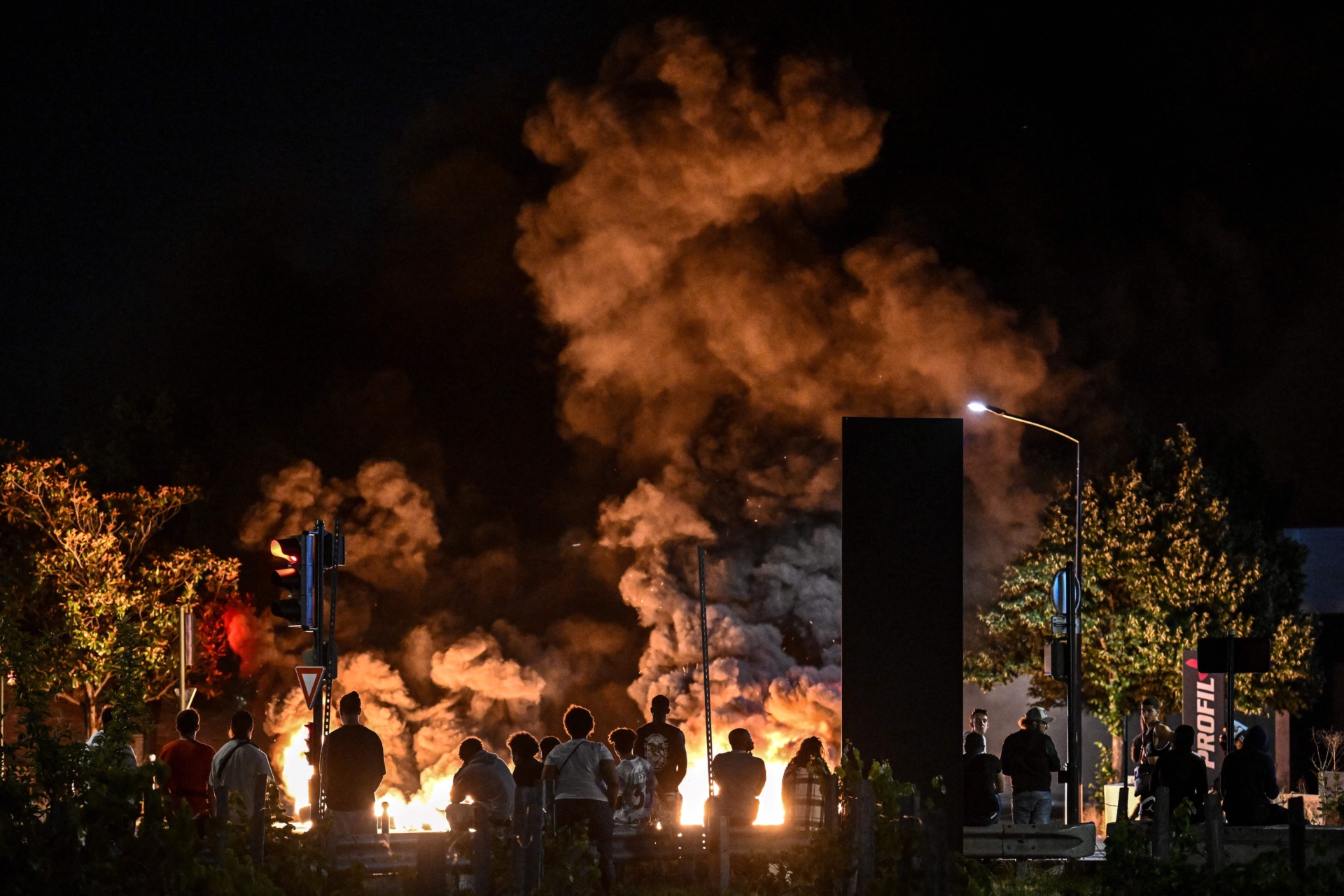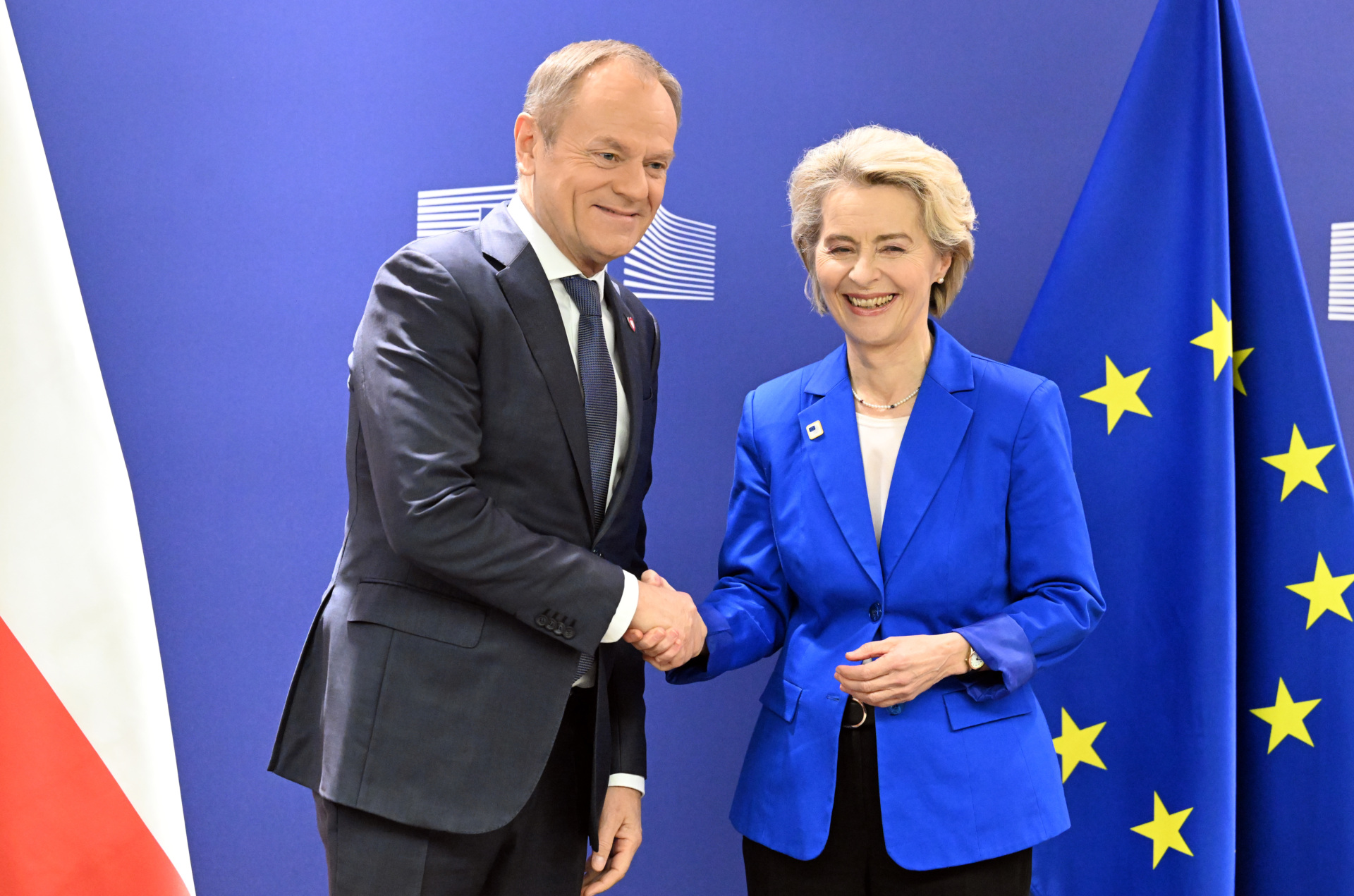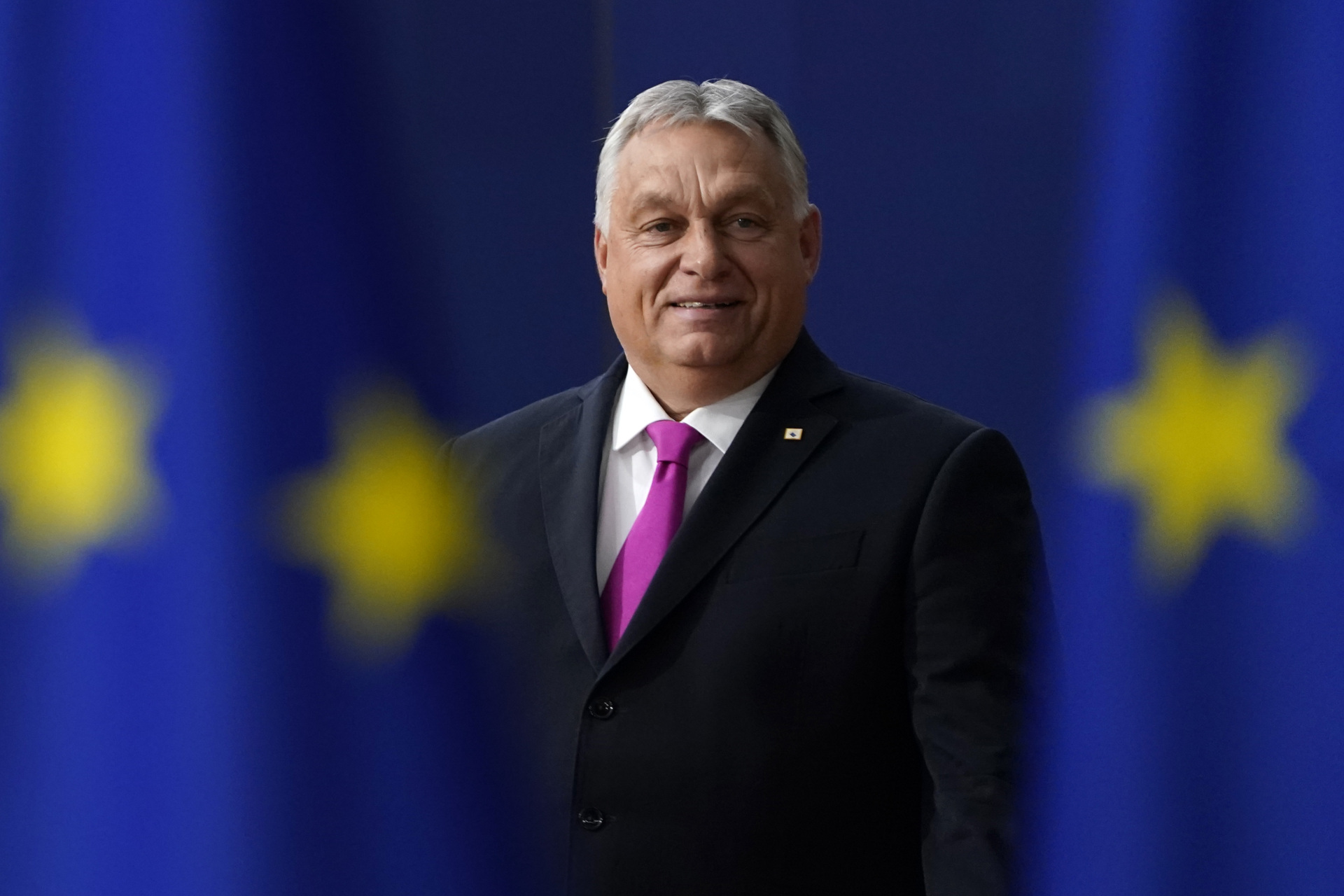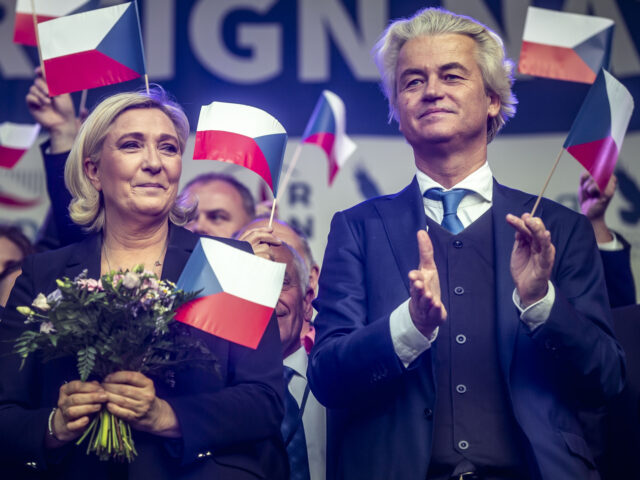Populist parties surged as the hubris of the European political establishment was exposed in 2023 and the failures of the open borders agenda were put on full display for the world to see.
Blinded by arrogance and globalist visions of grandeur, political elites in Europe have long dismissed legitimate concerns about the negative ramifications of mass migration on their societies, from the breakdown of social cohesion to the stress on public services and the economy as a whole.
Yet this year, as the politics of the Middle East took centre stage on the streets of Europe, as more citizens were slain by Islamist terrorists in Brussels and Paris, and imported anti-semitism raged in Berlin, the issue could no longer be pushed under the rug.
Perhaps, as populist parties promising to restore sensible immigration begin to rise across the continent, the establishment may finally realise that they are not masters of the universe, but merely servants who ignore the public at their own peril.
“The voice of the people is the voice of God”… Vox Populi, Vox Dei.
The Dutch Vanguard

PVV Party leader Geert Wilders (L) takes a selfie during the swearing-in of the House of Representatives as parliament sits for the first time after the recent election, in The Hague, on December 6, 2023. (Photo by Koen van Weel / ANP / AFP) / Netherlands OUT (Photo by KOEN VAN WEEL/ANP/AFP via Getty Images)
The Netherlands, which has been dominated by globalist governance over the past decade of Prime Minister Mark Rutte’s rule in The Hague, saw its political landscape completely upended by populist parties twice in 2023.
In March, the upstart Boer Burger Beweging (Farmer Citizen Movement, BBB) party, which was born out of the farmer tractor protest movement, swept to a surprise victory in the provincial elections and became the largest party in the Dutch senate over rising rural anger against the Great Reset-style agenda of the Rutte government to forcibly shut down thousands of farms to meet dubious European Union emissions standards.
The Dutch insurgent populist Farmer-Citizen Movement (BBB) party dominated last week’s provincial elections to such a degree that it became the largest party in the country despite being outspent in media advertising by ten other parties. https://t.co/FmxiyCZqa9
— Breitbart News (@BreitbartNews) March 26, 2023
Following her party’s success at the ballot box, the plain-speaking half-Irish BBB leader Caroline van der Plas played Cassandra and correctly predicted that the position of Mark Rutte, the country’s longest-serving prime minister in history, had become “unsustainable” and that there would be elections within the year. The prediction from van der Plas would come to pass, with Rutte’s government collapsing in July over a failure to come to an agreement on immigration between his neo-liberal coalition partners.
While the provincial elections were dominated by the pushback against the climate agenda, the national elections held in November came to be dominated by immigration, as Islamist terror attacks once again broke out across Europe in the wake of the barbaric October 7th Hamas terror attacks on Israel.
The rising concern about allowing millions of migrants from the Middle East and Africa saw veteran anti-mass migration populist Geert Wilders and his Party for Freedom (PVV) soar in the polls and ultimately ride the wave to a massive victory which sent shockwaves throughout Europe.
Anti-Mass Migration Populist Geert Wilders Wins Most Seats in Dutch Elections, Exit Polls Showhttps://t.co/U1n1EKvXPr
— Breitbart London (@BreitbartLondon) November 22, 2023
Although Wilders’ party won the most votes and became the largest party in the Dutch House of Representatives, as is typical in European capitals forming a government is only possible with the assistance of other parties to create a coalition, a laboriously slow process even by European standards in the Netherlands. While he has been backed by van der Plas and her pro-farmer party, notionally centre-right leaders have been more reticent so far, but talks are ongoing and have entered a new phase recently.
Nevertheless, the globalist centre-right whose seats are still needed to make a government may be unwilling to hold their noses and join a Wilders coalition to keep the left out over his longstanding opposition to the Islamisation of the Netherlands.
Yet, the fall of one of the stalwarts of globalism in the EU in Mark Rutte and the strong support for Wilders may be a harbinger of things to come in neighbouring Germany and nearby France, where populist factions are also on the rise, in the coming Euro elections in 2024.
An Alternative Rises in Germany

BERLIN, GERMANY – OCTOBER 08: People march to protest against the rising cost of living in a demonstration organized by the right-wing Alternative for Germany (AfD) political party on October 8, 2022 in Berlin, Germany. (Photo by Omer Messinger/Getty Images)
After languishing on the sidelines as a relatively fringe party for much of its ten-year history, the populist-nationalist Alternative for Germany (AfD) firmly established itself as a force to be reckoned with in the German political landscape in 2023.
With the country’s economy likely falling into a recession, Germany’s ability to subsidise mass migration and support for vast swaths of asylum seekers flooding into the country, which now included hundreds of thousands from Ukraine in addition to the continued flows from countries like Syria and Afghanistan, has been knocked. Polling shows more Germans are becoming disillusioned with the neo-liberal governance that had set the agenda under former Chancellor Angela Merkel and now under her successor and her former finance chief, Social Democrat and now-chancellor Olaf Scholz.
The AfD has seized on the public anger over mass migration, as well as the growing economic stagnation, to surge to the largest single party in the country. According to the most recent polling from RTL, the populist party hit another record in public support earlier this month, with 23 per cent backing the AfD, more than double their support level in the 2021 federal election. The right-wing nationalist party is firmly ahead of Chancellor Scholz’s Social Democrat Party (SPD), which stands at 14.8 per cent, as well as his coalition partner parties, with the Greens standing at 13 per cent and the Free Democratic Party (FDP) only boasting 5 per cent in the polls.
German Populist AfD Party Overtakes Chancellor Scholz’s Social Democrats in Support https://t.co/8CdqlvP3qt
— Breitbart London (@BreitbartLondon) June 15, 2023
The AfD only trails behind the combination of the Christian Democrat Union (CDU) and its sister party, the Christian Social Union in Bavaria (CSU) — which are often counted in the polls together given their strong alliance — who combined stand at 31 per cent.
The rising popularity of the AfD has caused panic among the political establishment in Berlin, with some even calling for the party to be banned outright, arguing banning political parties is necessary to protect democracy. Local AfD factions have been accused of harbouring racist views, or wishing to modify the German constitution, a serious matter in a country which treats its post-war document as sacrosanct.
Nevertheless, the party is poised to be a large player in next year’s European Union parliamentary elections and is widely expected to make significant gains in regional German state elections in Saxony, Thuringia and Brandenburg. Meanwhile, Chancellor Scholz, like other leaders across Europe has vowed to stem the tide of mass migration and to increase deportations, however, it remains to be seen how willing his leftist government will be to implement such policies, given that this year, Germany is on track for record legal and illegal migration.
France on Fire

TOPSHOT – People look at burning tyres blocking a street in Bordeaux, south-western France on late June 29, 2023, during riots and incidents nationwide after the killing of a 17-year-old boy by a police officer’s gunshot following a refusal to comply in a western suburb of Paris. (Photo by Philippe LOPEZ / AFP) (Photo by PHILIPPE LOPEZ/AFP via Getty Images)
In a similar fashion to Scholz in Berlin, French President Emmanuel Macron is also attempting to fend off populist challenges by vowing to increase deportations, recently coming to an agreement with Marine Le Pen’s National Rally on an immigration bill that will supposedly step up deportations, as well as measures to decrease the number of migrants coming to the country, including by reducing welfare benefits to foreigners.
However, it is doubtful, given the millions that have already arrived and continue to place strain on the country’s support structures, that immigration will subside as a chief political issue. This year, the consequences of the open borders agenda were put on full display, with George Floyd-style migrant-driven riots following the police killing of an Algerian heritage teenager seeing thousands of cars torched, over a thousand buildings set on fire, politicians targeted, hundreds of police injured and billions in damages over the summer.
France was once again the victim of Islamic terrorism in the wake of the outbreak of conflict in Israel, including the fatal stabbing of a teacher in Aras by a suspected Islamist illegal migrant in October. Earlier this month, a German tourist was slain and two others were injured in a stabbing spree in Paris by a man who allegedly cried out “Allahu Akbar” during the attack near the Eiffel Tower.
‘Savagery is Back’ in France as Macron’s Pledge to Restore Order by Bastille Day Goes Down in Flames https://t.co/ezty62gBJv
— Breitbart London (@BreitbartLondon) July 14, 2023
While Macron still has three years remaining in his second term as president, it is by no means a guarantee that he will last until the 2027 general election, as the former Rothschild banker was relegated last year into a minority coalition government and therefore needs to rely on other parties to continue governing the country in any meaningful way. Questions as to whether Macron could continue as president were openly raised last month in the French press after the far-left joined with Marine Le Pen’s populists in the National Assembly to shoot down the initial form of the immigration bill.
This month, the National Rally confirmed that it intends to back Le Pen once again for a third attempt to seek the presidency. Although she increased her vote share, notably among young and working-class voters in the 2021 election, she still fell short to Macron at the ballot box.
Yet, given that the French constitution prevents presidents from more than two consecutive terms, Macron will not be able to run again in 2027, and with no clear centrist successor in line, a third time may be the charm for Le Pen. Like the AfD in Germany, Le Pen’s National Rally is also expected to be a significant force in next year’s EU parliamentary elections.
But… Setbacks in Madrid and Warsaw

BRUSSELS, BELGIUM – DECEMBER 15: EU Commission President Ursula von der Leyen (R) meets with Polish Prime Minister Donald Tusk (L) in Brussels, Belgium on December 15, 2023. (Photo by Dursun Aydemir/Anadolu via Getty Images)
Undoubtedly, the biggest setback for the populist movement in Europe was the installation of arch-Brexit nemesis and top Eurocrat Donald Tusk as Prime Minister of Poland, meaning that Warsaw will once again be closely aligned with the globalist agenda preferred by Berlin, Brussels and Paris rather than Hungarian Prime Minister Viktor Orbán in Budapest.
Tusk came into power this month after coming in second place behind the previously governing Law and Justice (PiS) party in the October parliamentary elections. Despite the PiS gaining nearly a million more votes than Tusk’s Civic Coalition, the conservative party fell short of the necessary threshold to form a government, opening the way for Tusk to form a coalition government with two other small left-leaning parties.
Within days of coming into office, Tusk made moves to liquidate all public media, which has traditionally leaned conservative, in an attempt to consolidate power.
Globalist Takeover: Ex-Eurocrat Donald Tusk Installed as Polish Prime Minister, Vows Closer EU Ties and Support for Ukrainehttps://t.co/FyXaLGRT2J
— Breitbart London (@BreitbartLondon) December 12, 2023
In a similar setback, elections in Spain saw the centre-right People’s Party (PP) and the populist VOX party secure more votes than socialist Prime Minister Pedro Sanchéz and his coalition partners.
As in Poland, the right failed to gain enough votes to form a government outright, leaving room for Sanchéz to court Catalan separatist parties to back him in exchange for potential amnesty over attempts to break the country apart in 2017. Sanchéz was forced into a minority government, meaning that his grip on power will likely remain tenuous and growing divisions over his decision to side with literal separatists will likely further destabilise the country.

ROME, ITALY – DECEMBER 16: Italy’s Prime Minister giorgia Meloni and his British counterpart Rishi Sunak attend Atreju 2023, conservative politcal festival, on December 16, 2023 in Rome, Italy. (Photo by Alessandra Benedetti – Corbis/Corbis via Getty Images)
An honourable mention for populist setbacks should also go to Brexit Britain, with the Conservative-in-name-only government continuing to flounder on the issue of migration under Prime Minister Rishi Sunak, under whom legal net migration hit a record high of 672,000 this year. Despite promises of taking back control of the nation’s borders, successive Tory governments have refused to leave the European Convention of Human Rights (ECHR), which is technically separate from the EU and therefore Britain’s membership was unaffected by Brexit. The ECHR is often used by leftist lawyers to prevent deportations, and its associated court in Strasbourg has even issued orders preventing migrant removal flights.
The failures to deliver on the promises of Brexit will likely see the Conservatives kicked out of Downing Street next year in favour of Sir Keir Starmer’s left-wing Labour Party. It remains to be seen if a true populist party can rise in Britain with its first-past-the-post voting system or whether the Tories can shed the neo-liberals who have taken control of the once-conservative party.
Sinking Ship: Sunak’s Popularity Falls to Lowest of Premiership as 70 Per Cent Disapprove Amid Migration Failures https://t.co/kusqQKG0WL
— Breitbart London (@BreitbartLondon) December 15, 2023
Another honourable mention should be given to Italian Prime Minister Giorgia Meloni. Despite campaigning as a firebrand populist, Meloni has so far failed to deliver on her promises of cracking down on illegal immigration, with over 152,000 illegals crossing the Mediterranean and landing on Italian shores in 2023. Rather than implementing her hardline proposals, such as deploying the navy to enact a migrant blockade, Meloni has sought to craft deals with African governments to step up efforts to prevent people smugglers from operating on their coasts.
This has so far failed to deliver meaningful results, and although her government has recently passed legislation to ramp up deportations and signed a deal with Albania to house illegals, anything of an Australia-style turn-back the boats approach will likely see thousands continue to pour across the Mediterranean and overrun islands like Lampedusa.
What’s in Store for 2024

BRUSSELS, BELGIUM – OCTOBER 26: Hungary’s Prime Minister Viktor Orban arrives at EU Leaders Summit on October 26, 2023 in Brussels, Belgium. (Photo by Pier Marco Tacca/Getty Images)
Despite such setbacks, the populist movement is looking to go from strength to strength in the coming year, with polling suggesting that Eurosceptic and anti-mass migration parties set for large gains in the European Parliament elections in June, with the Identity and Democracy (ID) populist group currently projected to grow from 60 to 87 seats in the 705 seat EU assembly.
This would raise the possibility of a right-wing coalition taking over the EU Parliament, with a potential partnership between ID and the centre-right European People’s Party (EPP) and the conservative European Conservatives and Reformists (ECR). The prospect of a conservative majority, which would have seemed inconceivable just a decade ago, still has an uphill battle to go.
Even if they fall short, the large bloc within the EU assembly could serve to derail globalist projects on key issues, such as the Great Reset green agenda and mass migration.
Right-Wing Populists Set for Large Gains in EU Parliamentary Elections https://t.co/6DjJi4o0N0
— Breitbart London (@BreitbartLondon) August 10, 2023
With popular eurosceptic national figures such as Geert Wilders, Marine Le Pen, Giorgia Meloni, and Viktor Orbán all expected to lead their parties to victories in their countries in the EU parliamentary elections, there could also be a renewed push for national sovereignty within the bloc after decades of encroachment and mission creep from Brussels.
As is oft the case, the European elections in June may serve to foreshadow what is to come in the United States, where similar failures by the Biden administration to control migration may prove pivotal in the next presidential election.

COMMENTS
Please let us know if you're having issues with commenting.